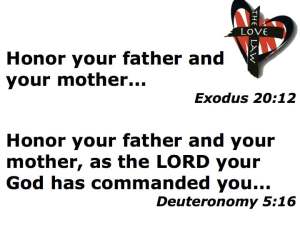 The Bible is fairly clear on a child’s relationship with his or her parents:
The Bible is fairly clear on a child’s relationship with his or her parents:
- Honor your father and your mother… (Exodus 20:12)
- Honor your father and your mother, as the LORD your God commanded you… (Deuteronomy 5:16)
- Children, obey your parents in the Lord… (Ephesians 6:1)
- Children, obey your parents in everything… (Colossians 3:20)
The Bible also gives some directives for parents:
- Teach your children about God’s laws… (Deuteronomy 6:4-9)
- Do not exasperate your children… (Ephesians 6:4)
- Do not embitter your children… (Colossians 3:21)
So children are to honor their parents, and their parents are to behave honorably. This can be a virtuous cycle, if both parent and child are doing this correctly. But what if a parent is not behaving honorably? Does the child still have to honor that parent?
In a word: Yes. The Bible doesn’t give children an option on this command. Nowhere do we read, “Only obey your Christian parents,” or “Honor your father only if he’s godly,” or “Respect your mother only if she is virtuous.” Children are simply called upon to honor and obey.
I like what Dr. Laura Schlessinger wrote—
“Honor does not mean unquestioned obedience, we truly honor our parents when we hold them accountable to God’s law. If my parents abandon me, I will honor them by seeking, though not forcing, reconciliation. If my parents abuse me, I will honor them by praying for them, so that they might see their error – and by escaping, if possible, so that they cannot continue to sin upon me. If my parents are unfaithful, I will honor them by calling for righteousness and by being willing to forgive them when they repent. If they are breaking the law, I will honor them by calling the police. Making them accountable to the highest moral order is honoring them in that I esteem them capable of responsible action.”
So here are 10 biblical ways children can honor their parents—
- Guard your thoughts about them.
- Obey their lawful commands.
- Submit to their correction.
- Hold them accountable to the moral law.
- Show appreciation for what they have given you.
- Keep them connected to the family (socially, emotionally, financially, physically).
- Don’t expect too much of them.
- Don’t resent them for what they aren’t, or for what they didn’t do.
- Forgive them and seek reconciliation.
- Emulate their virtues and reverse their shortcomings.
Not only does this please God, but it opens us up to the blessing He wants to give to children who honor their parents (Deuteronomy 5:16 and Ephesians 6:2-3).
If you have missed any of the messages in our series The Love In The Law, you can find them all by clicking here.




